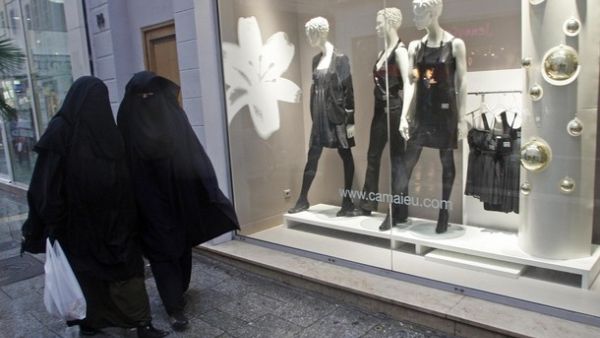A visit to Eiffel tower, a stroll down the glitzy Champs-Elysees or a wander into the most prestigious Parisian high streets. This may be a typical day-out for the typical tourist in France, but female Muslim visitors may start to feel the sting of the law.
France’s ban on face veils, a first in Europe, went into force last month. Those wearing a “niqab” or burqa in public, tourists included, could now face a fine of €150 ($214) and/or be ordered to have French citizenship classes.
France is the second-most popular destination for tourists from the Middle East. Middle Easterners tend to shop more than other tourists and stay in more expensive hotels, studies by the Paris tourist promotion agency show.
Parisian upmarket hotels rely heavily on businesses from the Gulf; an estimated 11 percent of guests were from the region last year.
Tourists from the Middle East had given France’s tourism industry a much-needed boost during the global credit crunch of 2008. The number of Middle East visitors jumped by an estimated 20 percent in the summer months of the crisis from the previous year. While in 2009, about 215,000 Middle Easterners visited Paris, which accounted for three percent of the eight million foreigners who visited Paris in 2009.
But the ban on the burka provoked a backlash from Muslim communities abroad, seen as an impingement on their religious freedom and democratic rights.
Rashida Mahmoud, a pharmacist living in the United Arab Emirates, wears the burqa. She has family in France—but now feels that she is no longer welcome in the European state.
“It’s like saying ‘you are no longer welcome here,’” Ms. Mahmoud said. “I used to go every summer to see my sister but now I feel disgusted by the ban. I’ll pay a fine but I won’t take it off, I don’t live there,” she added.
But Junior family minister Nadine Morano had said that visitors would have to “respect the law” and take off the face veil.
“When you arrive in a country you have to respect the laws of that country,” Ms. Morano said on France Info radio last year when the ban on tourists wearing the veil was announced.
This has prompted critics to question the awkwardness between the government and top Saudi-owned Parisian hotels that are flooded with guests from the Middle East throughout the year, such as Four Seasons Hotel George V in Paris. The hotel is 95 percent owned by Prince Alwaleed Bin Talal and Microsoft Corp.’s Bill Gates.
Saudis with businesses in France visit the country frequently with their families, which prominently include women who wear the burqa.
The French State Ombudsman, Jean-Paul Delevoye, is worried that the law could result in difficult situations, Reuters reported.
“I don't know what they're going to do with the Saudi women who go shopping on the Champs-Elysees,” Mr. Delevoye said also on French radio.
The Department of Tourism in the Ministry of Economy, Industry and Employment declined to comment about the matter when contacted Friday.
To date, there have been no reported incidents in which tourists have been fined, but economic analysts wait to see the effect on the tourism industry and if France will really lose out on Middle Eastern tourists.
“There is a lot of high-end tourism from the Gulf, so the economic impact will be huge,” Chahid Bouamarane, a general manger at Saudi-based Al Tayyar Travel Group told Maktoob News.
He also said many Middle Eastern tourists travel in family groups and it could be problematic if one member wears the veil.
Other Gulf-based travel companies have voiced fears over Middle Eastern tourists wishing to wear the burqa, saying that they may feel it is a violation of their privacy.
“People from this region are particularly sensitive about their privacy,” said Mohsin Kidwai, manager for holidays at UAE-based Orient Travels.
“They want to have fun when they travel and if they fear harassment somewhere they will change their destination.”
France, with at least 75 million foreign tourists per year, has an annual GDP of $2.16 trillion and a GDP per capita of $33,300. France is the most visited country in the world and maintains the third largest income in the world from tourism.
Widely benefiting from the Middle East’s big spenders, France’s annual tourism figures after the ban will be picked at and scrutinized by analysts seeking to spot a change in Middle Eastern tourist trends.
By Eman El-Shenawi








